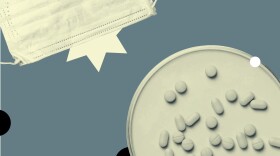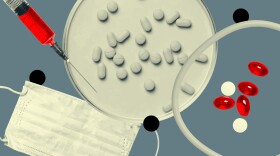Menstrual poverty endangers women's health and demoralizes the vulnerable. Here’s how the community is working to solve it
Keep it quiet, try not to complain, don’t let it affect your productivity, carry on as usual …
That’s an unwelcome and anxious stream of thought many women have every month — but it’s particularly unwelcome and anxious for women facing period poverty. Period poverty refers to a chronic lack of access to feminine hygiene products, as well as an absence of sanitary conditions for using those products. Period poverty and the stigma around it have always been a problem, but in recent years, it’s become a focus for women’s health advocates who feel the issue has been dismissed and overlooked for too long.
“This is for real, it’s a substantial issue,” says Captain Lisa Barnes, executive director for all of Southern Nevada’s Salvation Army branches, which serves thousands of homeless Nevadans each year. “Period supplies are usually the least donated item when the community comes together.” Why? Donors simply aren’t aware of the need. Add to that lack of awareness the effects of COVID — think supply-chain issues, stockpiling behavior, and unemployment — and Barnes says the period poverty problem is particularly “magnified” in Las Vegas.
Having access to pads or tampons is about more than just comfort. The dangers of period poverty are real. “People who are experiencing period poverty are either using things that are not meant for your period, or they’re using things that are meant for your period, but for too long,” says Wendi Schweigart, founder of Las Vegas charity Project Marilyn, which distributes more than 1,700 period kits a month around the valley. “(Period poverty) causes everything from mild infections to upsetting fertility.”
Southern Nevada is facing a bigger period poverty problem than most people realize. According to Kotex’s Alliance for Period Supplies, almost one in seven females 12-44 years old live below the federal poverty level in Nevada, putting them at greater risk of period poverty than their higher-income contemporaries. Nationally, two in five women say they’ve struggled to buy feminine hygiene supplies because they’re financially unable to. This puts some women in an unfair position — for example, having to choose between feeding their children or buying tampons. For many, the decision is obvious. “We make sacrifices,” Schweigart says. “Anyone that’s in that caregiving role is just going to do that.”
That’s why legislation such as SB415 is so crucial, says former Assemblywoman Ellen Spiegel; she was a primary sponsor of the 2017 bill that abolished the “tampon tax.” Approved as Question 2 by 56 percent of voters in 2018, the legislation has made Nevada only one of 23 other states to do away with the sales tax levied on all feminine hygiene products.
“This bill addressed an issue that has really just been ignored across the board,” Spiegel says. “If you’re only earning 54-82 percent of what your male counterparts are earning, you don’t necessarily have the same disposable income and the same discretionary income as somebody who’s earning 100 percent of what they should be earning for their job.”
A more recent piece of legislation, AB224, aims to address another shocking statistic: one in four young people in America miss school because of lack of access to period products. AB224, signed into law by Gov. Steve Sisolak in 2021, aims to erase period poverty among middle and high school students by requiring schools to stock free feminine hygiene supplies in bathrooms.
UNLV students such as Miah Strellnauer are also on the front lines of the effort to expand access to period products for local pupils. As the outgoing president of the American Medical Women’s Association, a student organization on the UNLV campus, Strellnauer and her fellow AMWA members organized a period product drive last year. Collecting enough for more than 115 kits, the association distributed them to both a local homeless shelter and UNLV’s Women’s Research Institute of Nevada office, so students can stop by anytime to grab free hygiene supplies. “If this is one thing that we can fix,” Strellnauer says, “I think that’s awesome.”
Yet, according to Schweigart of Project Marilyn, period products themselves are only one piece in the puzzle of period poverty. A bigger challenge is addressing the psychological impacts that a lack of access to period supplies has on women.
“We want our clients to know you are worthy to hold your head high — to get out there and get that job, to take care of your family, to take care of yourself,” Schweigart says, “and that starts with the very basic necessities, and one of those is period supplies.”
Barnes agrees. “When we address those needs before they become catastrophic, we continue to remind people of their dignity, and that they’re not a lesser human because this is a need in their life.”
Access to period supplies is expected to expand in the future, depending the generosity of the Las Vegas community. “A lot of times people aren’t meeting a need, because they just don’t know,” Barnes says. “But what’s so beautiful about Southern Nevada is that I’ve been able to serve in this capacity in lots of different cities, and I have never seen a community rally and support like Southern Nevada. Folks here care.” Φ










